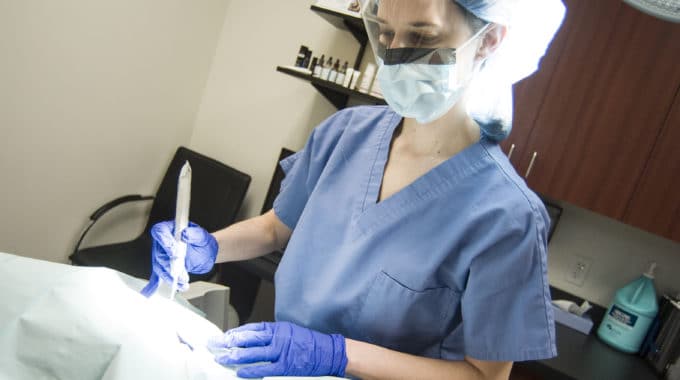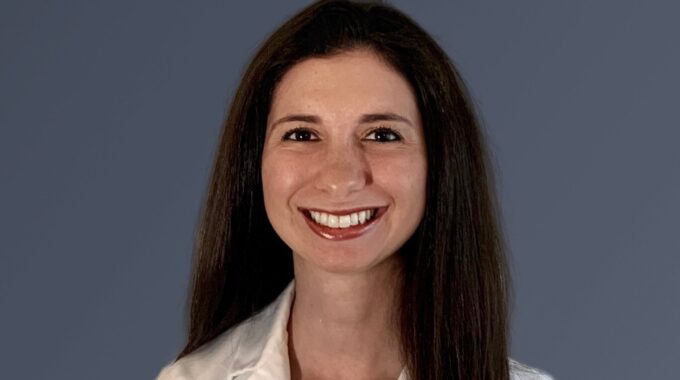
Dermatologic Surgery or Plastic Surgery For Your Skin Cancer
Massachusetts Dermatology Associates provides cutting edge surgical treatment with its state-of-the-art surgical facility and Mohs unit in Beverly, MA which is directed by Dr. Deborah Cummins. The question is sometimes raised by patients who are diagnosed with skin cancers at Massachusetts Dermatology Associates whether they will get a better outcome if they visit a plastic surgeon for treatment of these cancers.
“Many patients who are diagnosed with skin cancer wonder if they should have their cancer treated by a dermatologic surgeon or plastic surgeon” says Dr. Deborah Cummins, Surgical Director of Massachusetts Dermatology Associates. “After all, patients are no stranger to Nip/Tuck and are well aware of the magnificent cosmetic enhancements that are performed by plastic surgeons.” Dr. Cummins continues, “There is a fear by some patients that they will be disfigured by their skin cancer surgery and a misconception that having work done by a plastic surgeon guarantees that there will be no scar.” Where do dermatologists fit in? Dr. Cummins explains, “Both dermatologic surgeons and plastic surgeons are trained to surgically treat skin cancers and perform repairs to give the best possible cosmetic outcomes. However, there are a few distinct differences in their training. Mohs surgeons are surgical dermatologists who specialize in the Mohs technique which is uniquely designed to treat skin cancers on the face by sparing skin and maximizing cure rates. Plastic surgeons may be preferred for surgical reconstruction in very advanced cases of skin cancer where the tumor extends into deeper tissues such as bone and muscle.”
What is Mohs surgery? Mohs surgery (sometimes incorrectly written as Moh’s surgery) is a technique developed by Dr. Fredrick Mohs in the 20th century and later optimized wherein the dermatologic surgeon functions as both a pathologist and surgeon. Rather than cutting out the tumor and sending it to a pathologist for analysis (which can take several days), the Mohs surgeon reads his or her own pathology at the time of the surgery and is able to remove small pieces of skin cancer that remains on the edges of the treatment area in successive stages, ensuring that there are clear surgical margins by the end of the surgery. “To be clear: When patients go home at the end of the day of Mohs surgery, they know that the cancer is gone” explains Dr. Cummins. Mohs surgery is most routinely performed on non-melanoma skin cancer (e.g. basal cell carcinoma and squamous cell carcinoma) and has a reported cure rate of approximately 97%-99% for most squamous cell carcinomas and basal cell carcinomas.
The technique that plastic surgeons use most commonly to remove skin cancers is called “surgical excision” which has an approximately 94-95% cure rate for most basal cell and squamous cell carcinomas. Dermatologists also use the identical “surgical excision” technique for many skin cancers but fellowship-trained dermatologic Mohs surgeons prefer Mohs surgery to treat a subset of skin cancers on high risk or cosmetically sensitive areas such as the face, scalp, neck, or hands or for tumors which may have an aggressive behavior. The higher cure rate with Mohs surgery is thought to be due to differences between how the tissue is processed for pathologic analysis—With Mohs surgery, 100% of the surgical margin is examined; whereas for surgical excision the examined margin is significantly less. Unlike Mohs surgery, the surgical excision patient needs to wait several days after the surgery to determine if their cancer is clear and may need to come back for an additional surgery if there is cancer detected at the edges of the tissue that was removed. In some cases a surgeon who is not Mohs trained will have routine frozen section processing done intraoperatively to confirm clear margins but this technique assesses only a small fraction of the margin so it does not have the same accuracy rate as the Mohs technique.
Another difference between Mohs surgery and surgical excision is how much normal tissue is removed along with the tumor. With Mohs surgery, the tumor is removed in stages, and ONLY tissue containing tumor is removed–with a small rim of normal tissue. This is in contrast to surgical excisions which sacrifice larger amounts of normal tissue to maximize the chance that the patient won’t have to come back again for a re-exicison due to positive margins. Because Mohs surgery removes less normal tissue, it is likely to be superior to surgical excision for cosmetic outcome. After Mohs surgery, the surgical defect typically needs to be repaired. Fellowship-trained Mohs dermatologic surgeons are experienced in the most advanced tissue repair techniques such as adjacent tissue transfers (flaps) and skin grafts as well as straightforward linear closures, and there is typically no difference in the techniques that a dermatologic surgeon or plastic surgeon would use for the repair.
Mohs surgery is not appropriate for every skin cancer given that it requires significantly more time, expertise, and utilizes more resources than standard surgical excision. Patients need to check with their dermatologist whether Mohs surgery is an appropriate treatment for them.
In summary, plastic surgeons and dermatologic surgeons are two excellent options for treatment of skin cancer. For non-melanoma skin cancers in cosmetically and functionally sensitive areas such as the head, neck, hands, and feet Mohs surgery with a dermatologic surgeon will likely afford the highest cure rate and an excellent cosmetic outcome. For skin cancers on other parts of the body that do not qualify for Mohs surgery, patients are likely to get similar outcomes whether they visit a dermatologist or plastic surgeon. Additionally, tumors that are very deep and involve bone or muscle may benefit from the expertise of a plastic surgeon. In these cases a Mohs surgeon may perform the removal and the plastic surgeon would repair the defect.
Massachusetts Dermatology Associates is fortunate to have Dr. Deborah Cummins, a fellowship-trained Mohs surgeon and former Director of Dermatologic Surgery at Boston Medical Center, as Surgical Director. Dr. Cummins has performed thousands of Mohs surgeries and surgical excisions for patients in Boston and for patients on the North Shore of Massachusetts (in Beverly, Salem, Peabody, and beyond). To learn more about Mohs surgery at Massachusetts Dermatology Associates visit https://madermatology.com/skin-cancer-treatment/mohs-surgery/.


